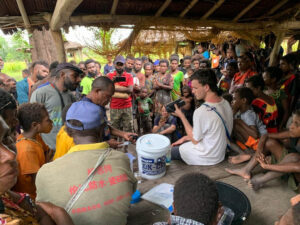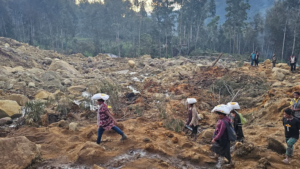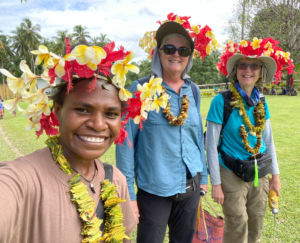By Hannah Stapleton
© 2024 Hannah Stapleton

In many parts of the world, menstruation remains a taboo topic. Women and girls’ ability to obtain an education, participate in the labour force, and experience a good quality of life is hindered by the stigma surrounding menstruation. In many developing countries, managing one’s period is further complicated by a lack of access to private sanitation facilities and appropriate menstrual hygiene products.
In remote areas of Papua New Guinea, women and girls face difficulties when it comes to accessing menstrual hygiene products. Beyond the physical challenges, menstruation often leads to social isolation. There are some deep-rooted beliefs and traditions that women are ‘dirty’ during their periods and cannot participate in regular household chores during this time or be around male relatives.
It is not uncommon for women to be expected to leave the village to manage their period — to wait in the sweltering heat of the jungle, completely alone, amidst potential dangers of mosquitoes, snakes, wild animals and bandits, until the bleeding stops.


Over the past few years, an Australian/Papua New Guinean NGO, Living Child, has been distributing reusable Days for Girls (DFG) menstrual hygiene kits throughout East Sepik Province. Its Health Promotions Officer, Naomi, has trained as a DFG Ambassador, and has visited a number of schools, community groups, churches, villages and the Provincial women’s prison to give out the kits and provide education on menstruation.
In remote regions of East Sepik Province, the distribution of menstrual hygiene kits represents more than just providing physical items; it is a step toward empowering women and girls, helping them maintain their dignity and stay safely engaged in their daily lives.
Living Child recently supported a number of humanitarian partners, including UNICEF PNG, to respond to a humanitarian incident in Angoram District, East Sepik Province. Three remote villages were attacked by a group of men in mid-July. Over 26 people were killed, homes were destroyed, and 200 people fled to the township of Angoram. Living Child volunteers, Gina and John, were in the area to attend farmer training, and so were able to assist UNICEF PNG for several months.
One of the major requests made to Living Child was to provide menstrual hygiene kits for the women and girls. They had left everything behind when they fled for their lives.

The DFG kits distributed by Living Child are more than just a temporary fix – they are designed to provide sustainable, long-term solutions for menstrual hygiene. Each kit is thoughtfully hand-sewn and packed with the following essential items (per the DFG website):
- The DFG Pad (two waterproof shields and eight absorbent liners).
- Care & use guide with visual instructions for how to care for DFG products and track menstrual cycles.
- Carry pouch made of water-resistant fabric to discreetly and safely stow used liners while on the go.
- Underwear for menstruators who may have few or no pairs.
- Soap & washcloths for personal and DFG product care.
- Drawstring bags made of beautiful locally sourced fabrics, provide a fashionable tote for DFG products and other everyday essentials.

Living Child volunteer, Gina, recently completed a distribution of over 60 kits to women and girls displaced by the violence in Angoram. Such a distribution is only possible thanks the generosity of Living Child’s suppliers. The materials for this group of kits were funded by Soroptimist International – Canning District, and lovingly hand-sewn by Days for Girls Perth and Days for Girls Albany. These groups work tirelessly to ensure that women and girls in underserved regions have access to the basic resources they need.
By providing women and girls with the tools they need to manage their periods safely and with dignity, Living Child, Days for Girls Perth and Albany, and Soroptimist International Canning District aim to ensure that menstruation is no longer a barrier to education, work, or social participation.

The many people involved in the journey that these kits take — hand-sewn in Western Australia, shipped to Wewak, driven by truck to Angoram, and taken on boats to the more remote regions — provide a powerful reminder of how small acts of kindness can have a ripple effect on the lives of entire communities. The distribution of menstrual hygiene kits might seem like a small intervention, but its impact is profound.
Some time ago, a local obstetrician, Dr. Grace Raire, took some DFG kits with her on a health outreach to a very remote community. She later wrote to Living Child:
I asked the women what they did when they menstruate and they told [me] that they go and stay in the Bush. I brought 20 reusable kits and explained how to use them and take care of them. They were so happy. The women called the menstruation kits “em safety” (meaning this will help us and keep us safe). “We can use it and stay in our house.” A team will travel back there in 2 weeks and will send some more for them. Thank you for helping our women here. It means so much to them.
As more communities come together to address menstrual equity, Living Child hope that one day, every girl and woman — no matter where they live — will have access to the menstrual hygiene products they need to lead healthy, fulfilling lives.
About the Author

Hannah Stapleton is the head of Administration and Communication at Living Child Inc., Bull Creek, West Australia. She can be reached through her LinkedIn page or at hannah@livingchildinc.org.au.
Read this article about UNICEF PNG’s work: Oky PNG: Putting Girls in the Front Seat to Design a Menstrual Health Solution
Related Articles

Papua New Guinea’s Rural Communities, Devastated by Disasters, Receive Medical Support
Direct Relief and Hope Worldwide are providing crucial medical support to rural Papua New Guinea communities devastated by recent natural disasters, including flooding and landslides. Their efforts address urgent health needs in an already strained healthcare system.

A Devastating Landslide Leaves Death and Instability in Its Wake. Direct Relief Responds.
Direct Relief is responding to a devastating landslide in Papua New Guinea, working with local partners to assess medical needs and deliver emergency aid to affected communities.

Sara David: Saving Mothers and Newborns in Papua New Guinea
Sara David, founder of Living Child Inc., has been training health workers in Papua New Guinea for over a decade, empowering communities and saving the lives of mothers and newborns.
